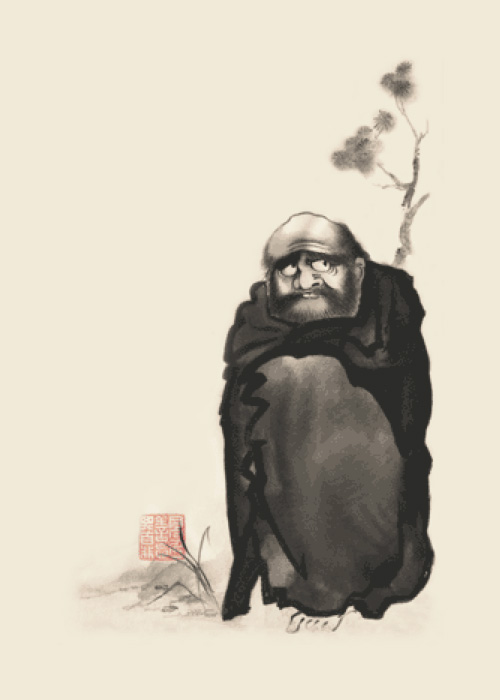Blue Cliff Record, Cases 17 and 20
Note: I am compiling a database of koans. So far there are 1,616 koans in the database. The koan which asks, in one way or another, the question “Why did Bodhidharma (or the Patriarch) Come from the West,” turns up thirty-two times. Besides our two entries in the Blue Cliff Record, the koan-question appears in the Wumenkuan, the Rinzairoku, the Record of Layman Pang, the Dentoroku, the Record of Dongshan, and the Iron Flute. Thirteen of these entries involve Chao-chou. I will include the Chao-chou koans in the discussion about this case.
First, from the Blue Cliff Record:
Case 17
A monk asked Hsiang Lin, “What is the meaning of the Patriarch’s coming from the West?
Hsiang Lin said, “Sitting for a long time becomes tiresome.”
Case 20
Lung Ya asked Ts’ui Wei, “What is the meaning of the Patriarch’s coming from the West?”
Wei said, “Pass me the meditation brace.”
Ya said, “Since you hit me I let you hit me. In essence though, there is no meaning of the Patriarch’s coming from the West?”
Ya also asked Lin chi, “What is the meaning of the Patriarch’s coming from the West?”
Chi said, “Pass the cushion.”
Ya took the cushion and handed it to Lin Chi; Chi took it and hit him.
Ya said, “Since you hit me I let you hit me. In essence though, there is no meaning of the Patriarch’s coming from the West?”
And now the Chao-chou koans:
Chao-chou, when wandering on pilgrimage, came for an interview with Lin-chi. He arrived just as the master was washing his feet and asked him: “What is the meaning of the ancestor’s coming from the West?”
Lin-chi replied: “Just as meeting me washing my feet.”
Chao-chou came closer as if he wanted to listen better. Lin-chi said: “I am about to throw out the second lot of dirty water.” On that, Chao-chou withdrew.
***
Chao-chou arrived at Lin-chi’s place. He was starting to wash his feet when Lin-chi asked, “What is the meaning of ‘Bodhidharma came from the west?’”
Chao-chou said, “I am just washing my feet.”
Lin-chi came near and listened attentively.
Chao-chou said, “If you have understood, so much the better. If you haven’t understood, don’t say a word. What would be the use?”
With a swing of his sleeves Lin-chi left.
Chao-chou said, “For thirty years I have been on a pilgrimage, and today, because of that man, I made the mistake of explaining.”
***
A monk asked, “What is the message of Bodhidharma who came from the west?”
The Master descended from his seat and stood there.
The monk asked, “Is this the real message itself?”
Chao-chou said, “It is something which is not spoken of.”
***
Chao-chou went to the lecture hall and preached to the people: “This matter is absolutely clear. Even the greatest ones cannot break away from it. When I was at Master Kuei-shan’s a monk said, ‘What does it mean, “Our founder came from the west’” [i.e., what is the meaning of Ch’an]? Isan said, ‘Bring me that chair.’ If one is a master, this is how one must relate to the people, through the core of the matter.”
At that, a monk asked, “What does it mean, ‘Bodhidharma came from the west’?”
Chao-chou said, “The oak tree in the front yard.”
The monk said, “Please do not show the people the object.”
Chao-chou said, “I will not.”
The monk repeated his question: “What does it mean, ‘Bodhidharma came from the west’?”
Chao-chou said, “The oak tree in the front yard.”
***
A monk asked, “What does it mean, ‘Bodhidharma came from the west?’”
Chao-chou stood up.
The monk said, “So that’s what it means.”
Chao-chou said, “I haven’t said anything yet.”
***
A monk said, “I will not ask about the various Buddhist doctrines. But what is the meaning of ‘Bodhidharma came from the west?’”
Chao-chou said, “The cow has given birth. Take good care of it.”
The monk said, “What is the meaning of this?”
Chao-chou said, “I myself don’t know.”
***
A monk asked, “What is the point of ‘Bodhidharma came from the west?’”
Chao-chou said, “It is the leg of the chair.”
The monk said, “That is what it is, isn’t it?”
Chao-chou said, “If that is what it is, you may remove it and take it with you.”
***
Someone asked, “What is the meaning of ‘Bodhidharma came from the west?’”
Chao-chou said, “How long was it that I hung the gourd-bottle on the eastern wall?”
***
A monk asked, “What is the meaning of ‘Bodhidharma came from the West?’”
Chao-chou said, “Even if you did not bring up this ‘meaning’ thing, you would not fare much better.”
The monk said, “What is ‘the origin of all things?’”
Chao-chou said, “Four eyes looking at one another. There is no subject other than that.”
***
Someone asked, “What is the meaning of ‘Bodhidharma came from the west?’”
Chao-chou said, “A cow broke out of its stall.”
***
A monk asked, “What is the meaning of ‘Bodhidharma came from the west?’”
Chao-chou said, “Why do you come to this temple cursing me?”
The monk said, “What have I done wrong?”
Chao-chou said, “Being in this temple, I cannot curse you.”
***
Someone asked, “What is the meaning of ‘Bodhidharma came from the west?’”
Chao-chou said, “Moss growing on one’s front teeth.”
***
Someone asked, “What is the meaning of ‘Bodhidharma came from the west?’
Chao-chou said, “Where did you get this information?”
Reflections
I feel whatever I say is useless. It’s all there in the Chao-chou koans. You’ve seen or heard that this koan has nothing at all to do with Bodhidharma, the Patriarch, his coming from the west, or north or south or east or anywhere for that matter. It has nothing at all to do with any meaning. So what’s the koan all about? In one of the Chao-chou koans a parenthetical aside indicates that the question really is,
“What is the meaning of Chan, or Zen?”
Or,
“What is the meaning of Life?”
“What is the meaning of Reality?”
“Why are we all here in this room practicing zen?”
“Listening to this supposed dharma talk?”
“What is the meaning of meaning?”
And once again please realize that this koan has nothing at all to do with meaning or Chan or Zen or Life or Reality or the practice e of zen or this dharma talk or meaning.
In order to make a first stumbling approach to this koan you need to drop all concepts of meaning, zen, life, reality, and so forth. Once they are gone, then you can slowly move towards the koan. Then maybe you can make a stab at it. Knowing however that whatever you do—whatever stab you make will miss. So why stab? Why study? Why bother?
I don’t know.
Case 17
A monk asked Hsiang Lin, “What is the meaning of the Patriarch’s coming from the West?
Hsiang Lin said, “Sitting for a long time becomes tiresome.”
Case 20
Lung Ya asked Ts’ui Wei, “What is the meaning of the Patriarch’s coming from the West?”
Wei said, “Pass me the meditation brace.”
Ya said, “Since you hit me I let you hit me. In essence though, there is no meaning of the Patriarch’s coming from the West?”
Ya also asked Lin chi, “What is the meaning of the Patriarch’s coming from the West?”
Chi said, “Pass the cushion.”
Ya took the cushion and handed it to Lin Chi; Chi took it and hit him.
Ya said, “Since you hit me I let you hit me. In essence though, there is no meaning of the Patriarch’s coming from the West?”



